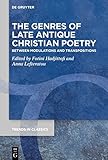The Genres of Late Antique Christian Poetry : Between Modulations and Transpositions / ed. by Fotini Hadjittofi, Anna Lefteratou.
Material type: TextSeries: Trends in Classics - Supplementary Volumes ; 86Publisher: Berlin ; Boston : De Gruyter, [2020]Copyright date: ©2020Description: 1 online resource (X, 335 p.)Content type:
TextSeries: Trends in Classics - Supplementary Volumes ; 86Publisher: Berlin ; Boston : De Gruyter, [2020]Copyright date: ©2020Description: 1 online resource (X, 335 p.)Content type: - 9783110689976
- 9783110696233
- 9783110696219
- Christian poetry, Early -- History and criticism
- Christian poetry, Greek -- History and criticism
- Christian poetry, Latin -- History and criticism
- Christianity in literature
- Classical poetry -- History and criticism
- Christliche Literatur
- Rezeption klassischer Literatur
- Spätantike
- LITERARY CRITICISM / Ancient & Classical
- Christian poetry
- Late Antiquity
- Literary genres
- Reception
- 881/.01093823 23
- online - DeGruyter
- Issued also in print.
| Item type | Current library | Call number | URL | Status | Notes | Barcode | |
|---|---|---|---|---|---|---|---|
 eBook
eBook
|
Biblioteca "Angelicum" Pont. Univ. S.Tommaso d'Aquino Nuvola online | online - DeGruyter (Browse shelf(Opens below)) | Online access | Not for loan (Accesso limitato) | Accesso per gli utenti autorizzati / Access for authorized users | (dgr)9783110696219 |
Frontmatter -- Contents -- Acknowledgements -- Abbreviations -- Prelude -- Generic Debates and Late Antique Christian Poetry -- Part I: Fugue in Minor: Epigram, Elegy, Epyllion -- Metrical Inscriptions in Late Antiquity: What Difference Did Christianity Make? -- Writing Classicizing Epigrams in Sixth-Century Constantinople: The Funerary Poems of Julian the Egyptian -- The Poet and the Light: Modulation and Transposition of a Prudentian Ekphrasis in Two Poems by Sidonius Apollinaris -- Poetological Name-Dropping: Explicit References to Poets and Genres in Gregory Nazianzen’s Poems -- The Significance of Meter in the Biblical Poems of Gregory Nazianzen (carmina I.1.12–27) -- Some Οbservations on the Genre of Dracontius’ Satisfactio -- Do Dracontius’ Epyllia Have a Christian Apologetic Agenda? -- Dracontius’ Medea and the Classical Tradition: Divine Influence and Human Action -- The Late Roman Alcestis and the Applicability of Generic Labels to Two Short Narrative Poems -- Part II: Fugue in Major: Epic -- The ‘Profanity’ of Jesus’ Storm-calming Miracle (Juvencus 2.25–42) and the Flaws of Kontrastimitation -- Writing a Homeric-Christian Poem: The Case of Eudocia Augusta’s Saint Cyprian -- Did Nonnus Really Want to Write a ‘Gospel Epic’? The Ambiguous Genre of the Paraphrase of the Gospel According to John -- Nonnus’ Paraphrase of the Gospel According to John as Didactic Epic -- Davidic Didactic Hexameters: The Generic Stance of the Metaphrasis Psalmorum -- The Lament of the Virgin in the I Homeric Centos: An Early Threnos -- George Pisides’ Expeditio Persica and Discourses on Warfare in Late Antiquity -- List of Contributors -- Index Auctorum Locorumque -- Thematic Index
restricted access online access with authorization star
http://purl.org/coar/access_right/c_16ec
Classicizing Christian poetry has largely been neglected by literary scholars, but has recently been receiving growing attention, especially the poetry written in Latin. One of the objectives of this volume is to redress the balance by allowing more space to discussions of Greek Christian poetry. The contributions collected here ask how Christian poets engage with (and are conscious of) the double reliance of their poetry on two separate systems: on the one hand, the classical poetic models and, on the other, the various genres and sub-genres of Christian prose. Keeping in mind the different settings of the Greek-speaking East and the Latin-speaking West, the contributions seek to understand the impact of historical setting on genre, the influence of the paideia shared by authors and audiences, and the continued relevance of traditional categories of literary genre. While our immediate focus is genre, most of the contributions also engage with the ideological ramifications of the transposition of Christian themes into classicizing literature. This volume offers important and original case studies on the reception and appropriation of the classical past and its literary forms by Christian poetry.
Issued also in print.
Mode of access: Internet via World Wide Web.
In English.
Description based on online resource; title from PDF title page (publisher's Web site, viewed 28. Feb 2023)


